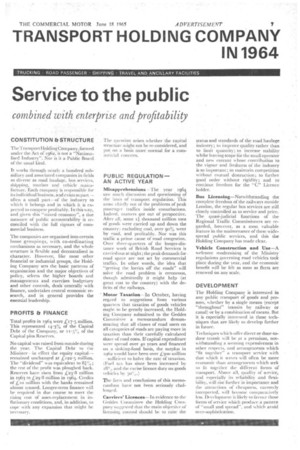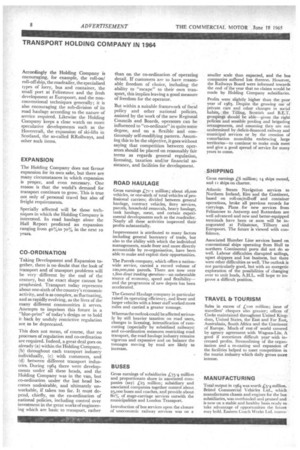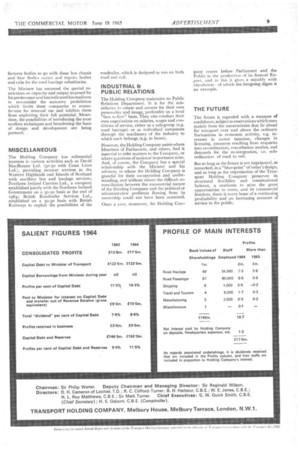TRANSPORT HOLDING COMPANY IN 1964
Page 9

Page 10

Page 11

If you've noticed an error in this article please click here to report it so we can fix it.
TRUCKING ROAD PASSENGER SHIPPING TRAVEL AND ANCILLARY FACILITIES
Service to the public
combined with enterprise and profitability
CONSTITUTION Et STRUCTURE
The Transport Holding Company, formed under the Act of 1962, is not a "Nationalised Industry". Nor is it a Public Board of the usual kind.
It works through nearly a hundred subsidiary and associated companies in fields as diverse as road haulage, bus services, shipping, tourismand vehicle manufacture, Each companY is responsible for its individual business, and exists as part often a small part-of the industry to which it belongs and in Which it is expected to coil-mete profitably. In thisway, and given this "mixed economy", a due measure of public accountability is reconciled with the full rigours of commercial business.
The companies are organised into certain loose groupings, with co-ordinating mechanisms as necessary, and the whole structure is flexible and decentralised in character. However, like most other financial or industrial groups, the Holding Company sets the basic patterns of organisation and the major objectives of policy, selects the higher boards and managements and exercises budgetary and other controls, deals centrally with finance, undertakes central economic research, and in general provides the essential leadership.
PROFITS Et FINANCE
Total profits in 1964 were kr7-5
This represented 14-30/o of the Capital
Debt of the Company, or r of the Capital plus Reserves.
No capital was raised front outside during the year. The Capital Debt to the Minister —in effect the equity capital-remained unchanged at L122.5 million. The "dividend" was equivalent to N.,;,; the rest of the profit was ploughed back. Reserves have risen from k23.8 million in 1963 to L29-8 million in 1964. Credits of kit) million with the banks remained almost unused. Longer-term finance will be required in due course to meet the rising cost of asset-replacement in inflationary conditions, and, in addition, to cope with any expansion that might be necessary.
The quest ion arises 1,ylietliter the capital structure might not be re-considered, and put on a basis more normal for a comme'rcial concern.
PUBLIC REGULATION— AN ACTIVE YEAR
Misappreheitgions—The year 1964, saw inuch discussion and questioning of the basis of transport regulation. This arose chiefly out of the problems of peak passenger traffics inside conurbations. Indeed. matters got out of perspective.
After all, some thousand million tons of goods were carried up and down the country excluding coal, over 9o% went by road, and profitably.. Nor: was this traffic a prime cause of road • congestion. Over three-quarters of the longer-distance work of British Road Services is carried out at night ; the peak demands forroad space are not set by Commercial traffics, In other words, the idea that "getting the lorries off the roads" will solve the thad problem is erroneous, though admittedly it might help (at great cost to the country) with the deficits of the railways.
Motor TaxationIn October, having regard to suggestions from various quarters that taxation of goods vehicles ought to be greatly increased, the Holding' Company submitted to the Geddes Conmmitiee a memorandum demonstrating that all classes of road users on all categories of roads are paying more in taxation than their carefully calculated share of road costs. If capital expenditure were spread over 40 years and financed on is sinking-fund basis, the surplus in 1962 would have been over k3oo million --sufficient to halve the rate of taxation. (Fuel tax has since been increased by t 8'.!„ and the excise licence duty on good's vehicles by
The facts and conclusions of this memorandum have not been seriously challenged.
Carriers' Licences—In evidence to the Geddes Committee the Holding Company suggested that the main objective of licensing control should bit to raise the
status and standards of the road haulage industry; to improve quality rather than to limit quantity; to increase stability whilst leaving scope for the small operator and new entrant whose contribution to the vigour and freshness of the industry is so important; m maintain..eompetition without mutual destruction; to further good order without rigidity; and to' continue freedom for the "C" Licence holder.
Bus Licensing—Notwithstanding the complete freedom of the railways Outside London, the regular bus services are still closely controlled as to service and price. The quasi-judicial functions of the Regional Traffic Commissioners arc regarded, however, as a most valuable feature in the maintenance of these widespread public services, and this die Holding Company has made clear.
Vehicle Construction and Use—A welcome modernising of the Ministry regulations governing road vehicles took place during the year, and the economic benefit will be felt as soon as fleets are renewed on any scale.
DEVELOPMENT
The Holding Company is interested in any public transport of goods and persons, whether by a single means (except "throughout" transits by railway or canal) or by a combination of means. But it is especially interested in those techniques that are likely to develop further in future.
Techniques which offer direct or door-todoor transit will be at a premium, notwithstanding a seeming expensiveness in other respects, and arrangements which "fit together" a transport service with that which it serves will often be more econom ic I han arrangements which seek to fit together the different forms of transport. Above all, quality of service, and especially its reliability and flexibility, NA ill rise further in importance and the attractions of cheapness, narrowly interpreted, will become comparatively less. Development is likely to favour those forms of service which produce a pattern of "small and spread", and which avoid over-sophistication. Accordingly the Holding Company is encouraging, for example, the roll-on/ roll-off ship, the roadrailer, the specialised types of lorry, bus and container, the small port at Felixstowe and the fresh development at Europoort, and the nonconventional techniques generally; it is also encouraging the sub-division of its road haulage according to the nature of set-vice required. Likewise the Holding Company keeps a close watch on more speculative developments such as the Hovercraft, the expansion of ski-lifts in Scotland, the so-called RRollways, and other such items.
EXPANSION
The Holding Company does not favour expansion for its own sake, but there are many circumstances in which expansion is proper, and even necessary. One reason is that the world's demand for transport continues to grow. This is true not only of personal travel but also of freight requirements.
Specially affected will be those techniques in which the Holding Company is interested. In road haulage alone the Hall Report predicted an expansion ranging from 40%to 70% in the next to
years.
CO-ORDINATION
Taking Development and Expansion together, there is no doubt that the look of transport and of transport problems will be very different by the end of the century, but the exact shape cannot be prophesied. Transport today represents about one-sixth of the country's economic activity, and is as complex, as fluctuating, and as rapidly evolving, as the lives of the many different communities it serves. Attempts to imprison this future in a "blue-print" of today's design or to hold it back by unduly restrictive regulation are to be deprecated.
This does not mean, of course, that no processes of regulation and co-ordination are required. Indeed, a great deal goes on already (a) within the Holding Company, (b) throughout each transport industry individually, (c) with customers, and (d) between different transport industries. During 1964 there were developments under all these heads, and the Holding Company was in the van, but co-ordination under the last head becomes undesirable, and ultimately unworkable, if taken too far. It must depend, chiefly, on the co-ordination of national policies, including control over investment in the great works of engineering which are basic to transport, rather than on the co-ordination of operating detail. If customers are to have reasonable freedom of choice, including the ability to "escape" to their own transport, this implies leaving a good measure of freedom for the operator.
But within a suitable framework of fiscal policy and other national policies, assisted by the work of the new Regional Councils and Boards, operators can be influenced to "co-ordinate" in quite some degree, and on a flexible and continuously self-modifying pattern. Assuming this to be the objective, it goes without saying that competition between operators should be placed on reasonably fair terms as regards general regulation, licensing, taxation and/or financial assistance, and facilities for development.
ROAD HAULAGE Gross earnings k7s 4s million;about s6,000 vehicles, or one-sixth of total vehicles of professional carriers; divided between general haulage, contract vehicles, ferry services, parcels, household removals, heavy haulage, tank haulage, meat, and certain experimental developments such as the roadrailer. Nearly all these activities improved their profits substantially.
Improvement is attributed to many factors including general buoyancy of trade, but also to the ability with which the individual managements, made freer and snore directly accountable by re-organisation, have been able to make and exploit their opportunities.
The Parcels company, which offers a nationwide service, carried a record volume of too,000,000 parcels. There are now over 1,600 direct trurzking operations—an unbeatable source of economy, speed and flexibility— and the programme of new depots has been accelerated.
The General Haulage company in particular raised its operating efficiency, and fewer and larger vehicles with a lesser staff worked more miles and carried a greater tonnage.
Whereas the outlook could be affected seriously by still heavier taxation on road users, changes in licensing, intensification of ratecutting (especially by subsidised railways) and co-ordination measures restricting road transport, the road haulage industry remains vigorous and expansive and on balance the tonnages moving by road are likely to increase.
BUSES Gross earnings of subsidiaries L75.4 million and proportionate share in associated companies (say) kg3 million; subsidiary and associated companies together control about 23,000 buses and coaches, and provide about 80% of stage-carriage services outwith the municipalities and London Transport.
Introduction of bus services upon the closure of uneconomic railway services was on a smaller scale than expected, and the bus companies suffered loss thereon. However, the Railways Board were informed towards the end of the year that no claims would be made by Holding Company subsidiaries.
Profits were slightly higher than the poor year of 1963. Despite the growing use of private cars and other changes in social habits, the Tilling, Scottish and B.E.T. groupings should be able—given the right policies and sensible pooling and brigading arrangements, and assuming they are not undermined by deficit-financed railway and municipal services or by the creation of conurbation monoliths embracing large territories—to continue to make ends meet and give a good spread of service for many years to come.
SHIPPING Gross earnings £6 million; 14 ships owned, and is ships on charter.
Atlantic Steam Navigation services to Northern Ireland, Eire and the Continent, based on roll-onfroll-off and container operations, broke all previous records for carryings. Plans for new services from Felixstowe to Antwerp and Rotterdam are well advanced and new and better-equipped terminals have been or soon will be inaugurated at Felixstowe, Tilbury and Europoort. The future is viewed with confidence.
Associated Humber Line services based on conventional ships operating from Hull to northern Continental ports did not do so well. Labour difficulties disrupted sailings, upset shippers and lost business, but there were other difficulties as well. The outlook is not particularly good, but with an energetic exploration of the possibilities of changing over to unit loads, A.H.L. will hope to im. prove a difficult position.
TRAVEL Et TOURISM Sales in excess of Li oo million; issue of travellers' cheques also greater; offices of Cooks maintained throughout United Kingdom, United States, the East and Far East, Australasia, South Africa and the Continent of Europe. Much of rest of world covered by agency agreement with Wagons-Lits. A good if sometimes difficult year with increased profits. Streamlining of the organisation and a re-casting and expansion of the facilities helped to meet competition in the tourist industry which daily grows more intense.
MANUFACTURING Total output in 1964. was worth £5.4 million. Bristol Commercial Vehicles Ltd., which manufactures chassis and engines for the bus subsidiaries, was overhauled and pruned and is now on a stable and healthy basis ready to take advantage of opportunities the future may hold. Eastern Coach Works Ltd. mann
factures bodies to go with these bus chassis anti Star Bodies makes and repairs bodies and cabs for the road haulage subsidiaries.
The Minister has removed the special restrictions on capacity and output imposed by his predecessor and has indicated his readi ness to re-consider the statutory prohibition hich limits these companies to manufacture kit internah use and inhibits them from exploiting their full potential. Meantime, the possibilities of 'introducing the most modern techniques and broadening the basis of design and development are being pursued.
MISCELLANEOUS
The Holding Company has substantial interests in various activities such as David MacBrayne Ltd. (50-50 with Coast Lines Ltd.), providing steamer services in the Western Highlands and Islands of Scotland with ancillary bus and haulage services; Northern Ireland Carriers Ltd., a company established jointly with the Northern Ireland Government on a 50-50 basis at the end of 1964; British Road railer Services Ltd., established on a 50-50 basis with British Railways to exploit the possibilities of the
roadrailer, which is designed to run on both road and rail.
INDUSTRIAL Et PUBLIC RELATIONS
The Holding Company maintains no Public Relations Department. It is for the subsidiaries to create and answer for their own personality and image, preferably on a local "face in thee" basis. They also conduct their own negotiations on salaries, wages and conditions of service, either as a sub-group (e.g. road haulage) or as individual companies through the machinery of the industry to which each belongs (e.g. in buses).
However, the Holding Company assists where Members of Parliament, and others, find it essential to refer matters to the Company, or where questions of national importance arise. And, of course, the Company has a special relationship with the Minister and his advisers, to whom the Holding Company is grateful for their co-operation and understanding, and without whom the difficult reconciliation between the commercial nature of the Holding Company and the political or administrative problems flowing from its ownership could not have been sustained.
Once a year, moreover, the Holding Coin
pany comes before Parliament and the Public • '1 he production of its Annual Repot t, and to ibis it gives a suitably wide circulationof which the foregoing digest is an example:
THE FUTURE
The future is regarded with a measure of confidence, subject to reservations which stem mainly from the uncertainties that lie ahead for transport over and above the ordinary fluctuations in economic activity, e.g. increases in motor taxation, changes in licensing, measures resulting from enquiries into co-ordination, conurbation studies, and demands for the re-integration, i.e. subordination of road to rail.
But so long as the future is not imprisoned, as remarked, in a "blue-print" of today's design, and so long as the organisation of the Transport Holding Company preserves its structural flexibility and constitutional balance, a readiness to seize the great opportunities to come, and its commercial freedom, there is every hope of a continuing profitability and an increasing measure of service to the public.




































































































































